Musk vs. Altman: The $97B Battle That Could Reshape AI Forever
Elon Musk's $97.4 billion bid to acquire OpenAI is bringing chaos to the tech industry, igniting a fierce battle over the future of artificial intelligence. This bold move by Musk and his consortium of investors challenges not just OpenAI's planned transition to a for-profit model, but also raises fundamental questions about AI development's direction.
The bid brings to light the complex relationship between Musk and Sam Altman, from co-founders to rivals, and their contrasting visions for AI's future. Adding to the drama is the controversial $500 billion Stargate Project, OpenAI's massive AI infrastructure initiative that has drawn both presidential support and sharp criticism from Musk himself.
This isn't just about a potential acquisition - it's about control, vision, and the future of one of the most transformative technologies of our time.
Let's get into it and learn everything about it.
The Bid Details
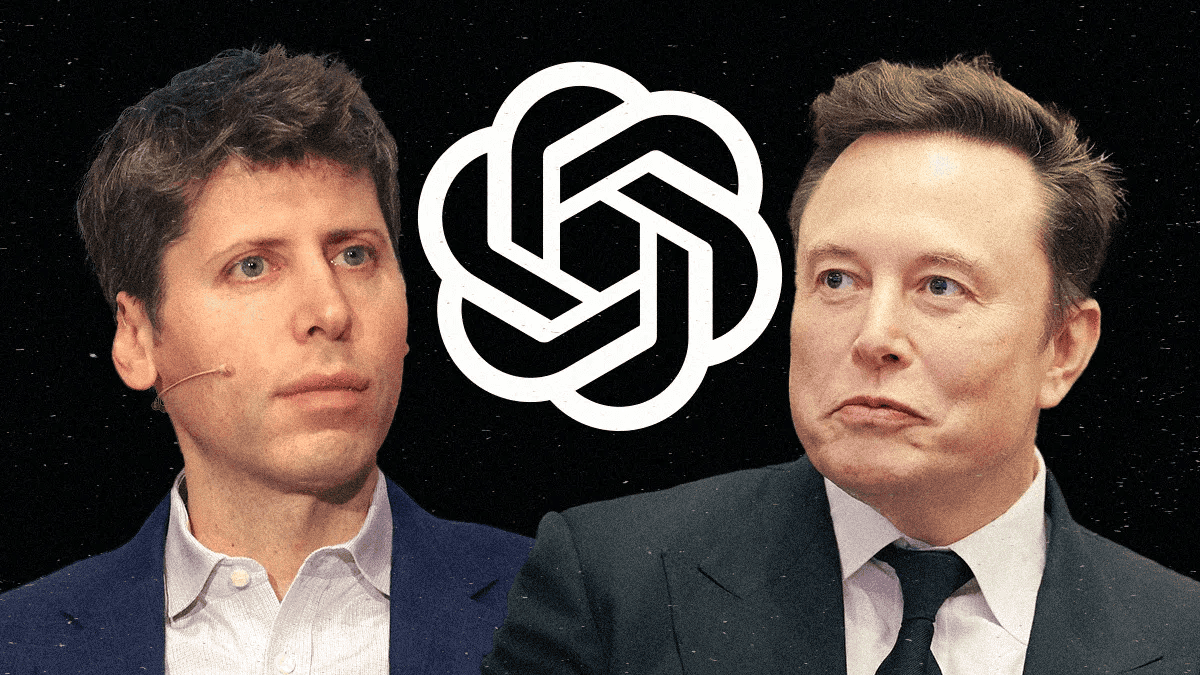
Image Source:Adweek
Elon Musk has made a bold move in the AI industry by leading a $97.4 billion bid to acquire OpenAI's nonprofit organization. The bid, submitted on February 10, 2025, comes through his attorney Marc Toberoff and represents a significant attempt to reshape OpenAI's future direction.
The bid brings together a strong group of investors backing Musk's vision:
xAI (Musk's artificial intelligence company) is serving as the primary strategic partner, with plans to potentially merge with OpenAI if the deal goes through
Major financial institutions including Baron Capital Group, Valor Equity Partners, and Atreides Management have joined the consortium
Notable backers include Ari Emanuel's investment fund and 8VC, led by Palantir co-founder Joe Lonsdale
Vy Capital has also committed to supporting the bid
However, the current offer appears to significantly undervalue OpenAI based on recent market assessments. The company was valued at $157 billion during its last funding round in October 2024, and recent discussions with SoftBank suggest a potential valuation of up to $300 billion.
In response to this gap, Musk's legal team has stated they are prepared to match or exceed any competing bids that might emerge.
The formal bid submission process involved direct communication with OpenAI's board of directors, with Toberoff handling the legal aspects of the proposal.
This move adds complexity to OpenAI's ongoing plans to transition from a nonprofit to a for-profit structure, potentially forcing the board to carefully evaluate the offer against their current strategic direction.
Background: OpenAI's Complex Structure
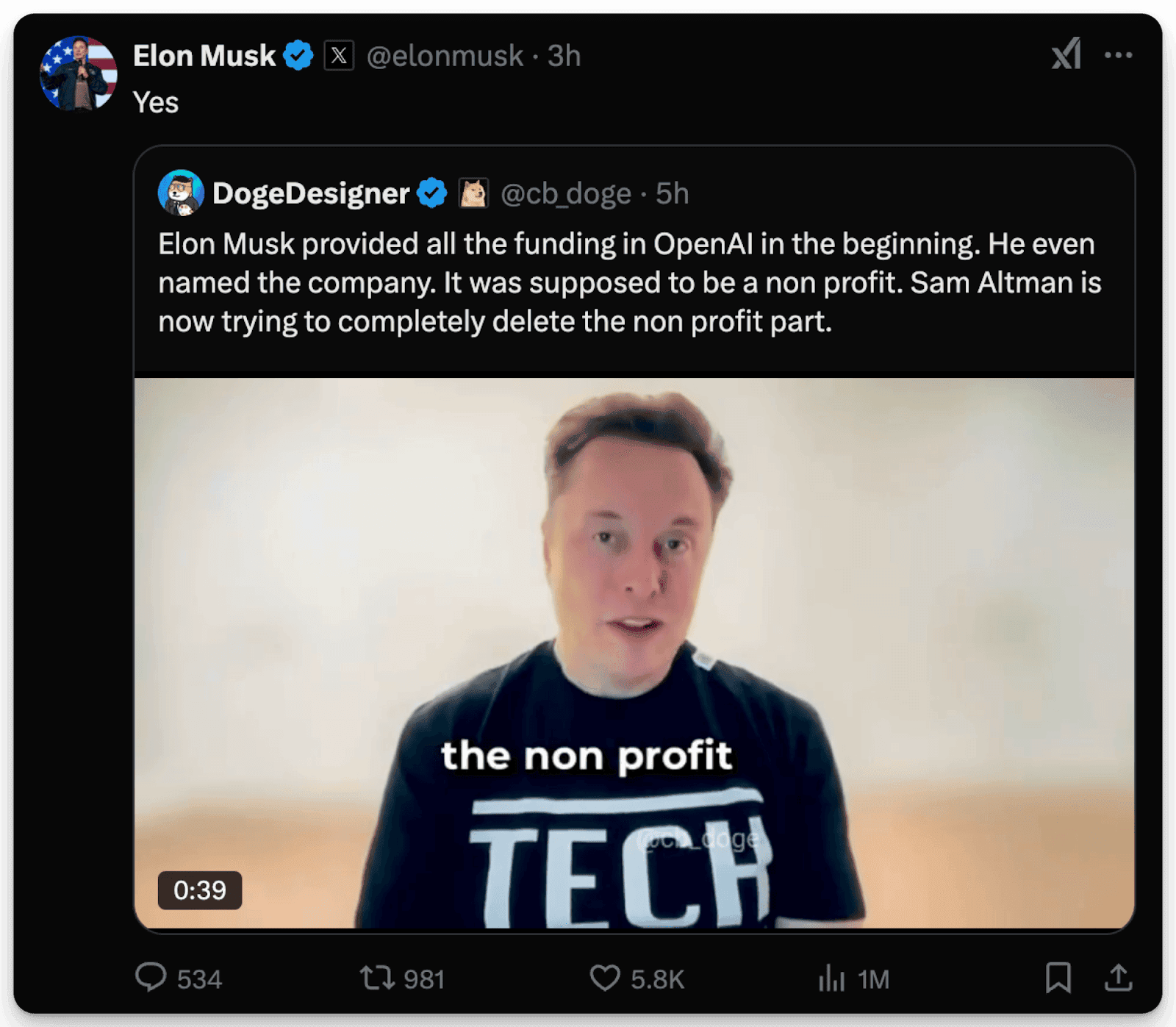
OpenAI's journey began in 2015 when Elon Musk and Sam Altman co-founded it as a nonprofit organization focused on developing artificial intelligence for the benefit of humanity. However, the organization's structure has evolved significantly since its founding days.
Key aspects of OpenAI's structure include:
A unique hybrid model was established in 2019, combining both nonprofit and for-profit elements
The nonprofit arm maintains oversight of the organisation's mission and direction
A for-profit subsidiary called OpenAI LP handles commercial operations and product development
Microsoft emerged as a major strategic partner, investing billions and gaining exclusive access to certain AI technologies
In recent years, OpenAI has been working towards converting into a traditional for-profit company, with plans to complete this transition by late 2026.
This change aims to help the organization raise more capital for AI development and research. Under the proposed structure, the nonprofit would maintain equity ownership in the new for-profit entity.
This structural shift has become a central point of controversy, particularly in light of Musk's recent bid and his criticism of the organization's departure from its nonprofit roots.
The Musk-Altman Rivalry
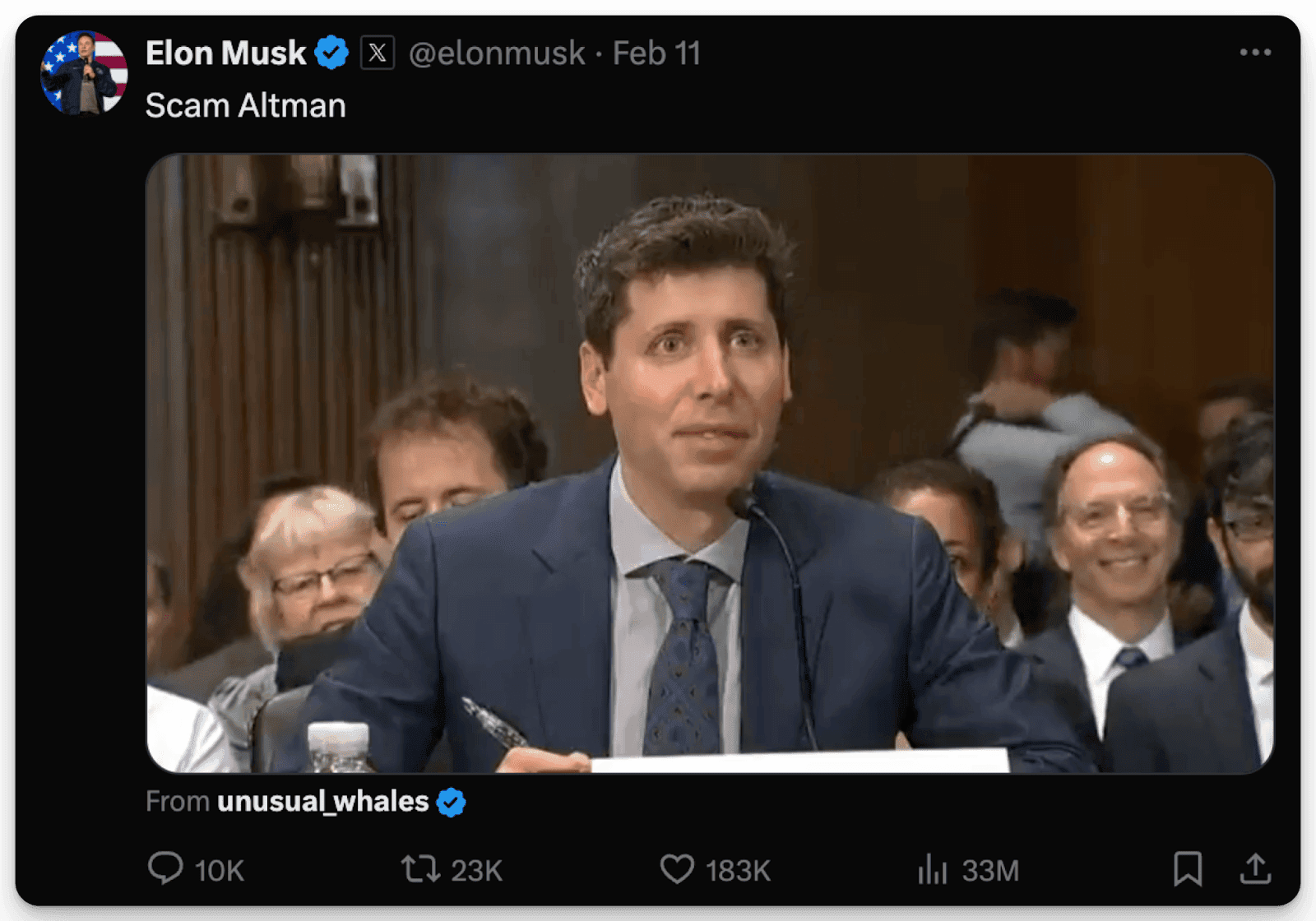
The relationship between Elon Musk and Sam Altman has transformed from a collaborative partnership to a complex rivalry since OpenAI's founding. Their journey together began in 2015 when they co-founded OpenAI with a shared vision of developing safe artificial intelligence for humanity's benefit.
Major turning points in their relationship include:
Musk's departure from OpenAI before the company's major breakthrough with ChatGPT
The creation of his own AI company, xAI, in 2023 as a direct competitor
A shift from collaboration to public criticism and legal challenges
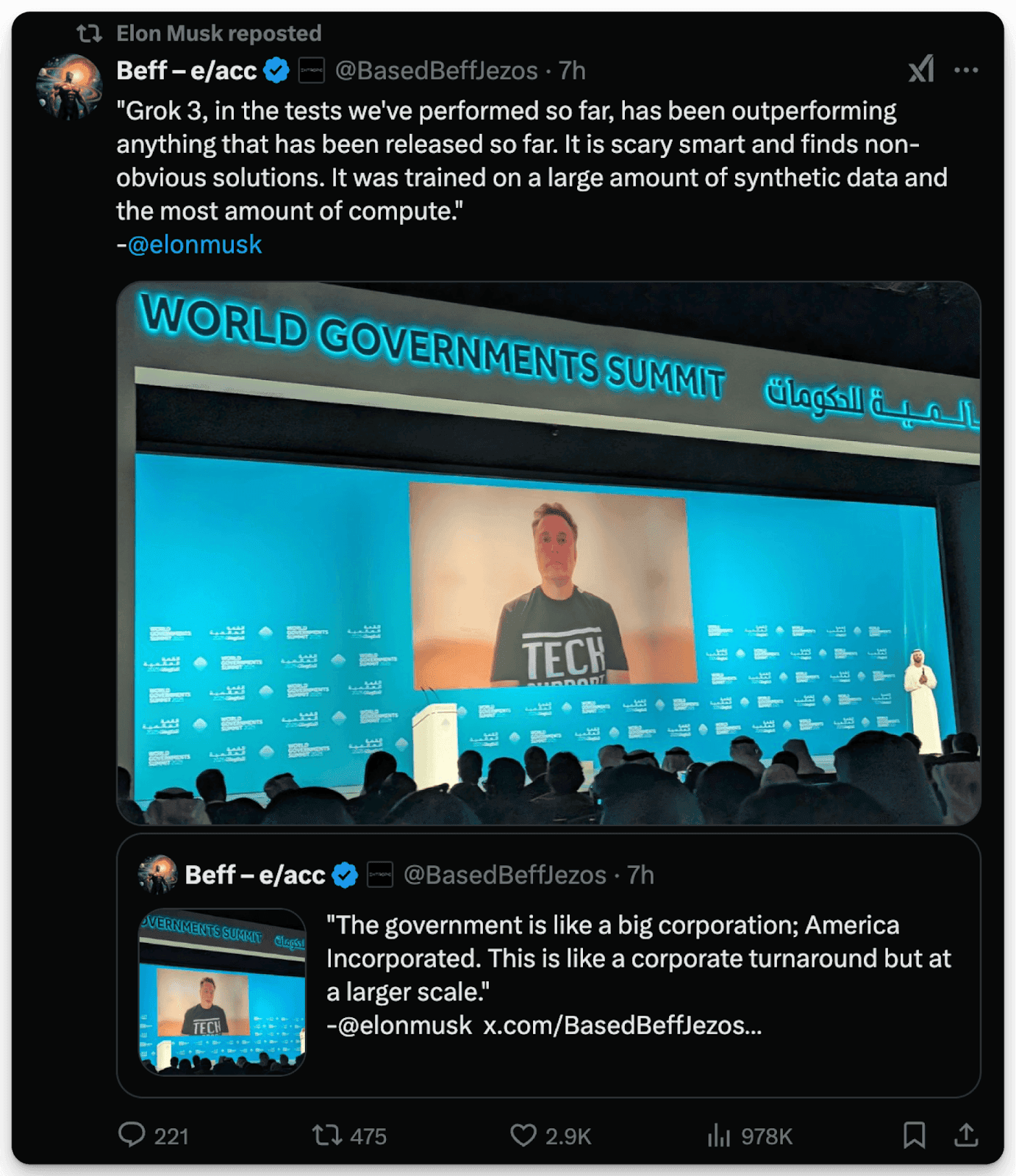
The tension between these tech leaders has recently played out in public exchanges. When Musk made his $97.4 billion bid for OpenAI, Altman responded with a pointed message on X, stating "no thank you but we will buy twitter for $9.74 billion if you want," clearly mocking the offer.

Musk has expressed his disapproval of OpenAI's direction through various public statements, notably comparing the situation to a nonprofit meant to preserve the Amazon rainforest instead turning into a lumber company.
He argues that OpenAI has strayed from its original mission of being "open source, nonprofit" to become "closed for maximum profit."
In response, Altman has taken a direct stance in recent interviews, suggesting that Musk's actions stem from competitive insecurity rather than genuine concern for AI safety. He specifically characterized Musk as "a competitor who is not able to beat us in the market" and is therefore attempting to gain control through acquisition.
These ongoing exchanges highlight the deep divide between the former partners and their differing visions for AI development and governance.
The Stargate Project Controversy
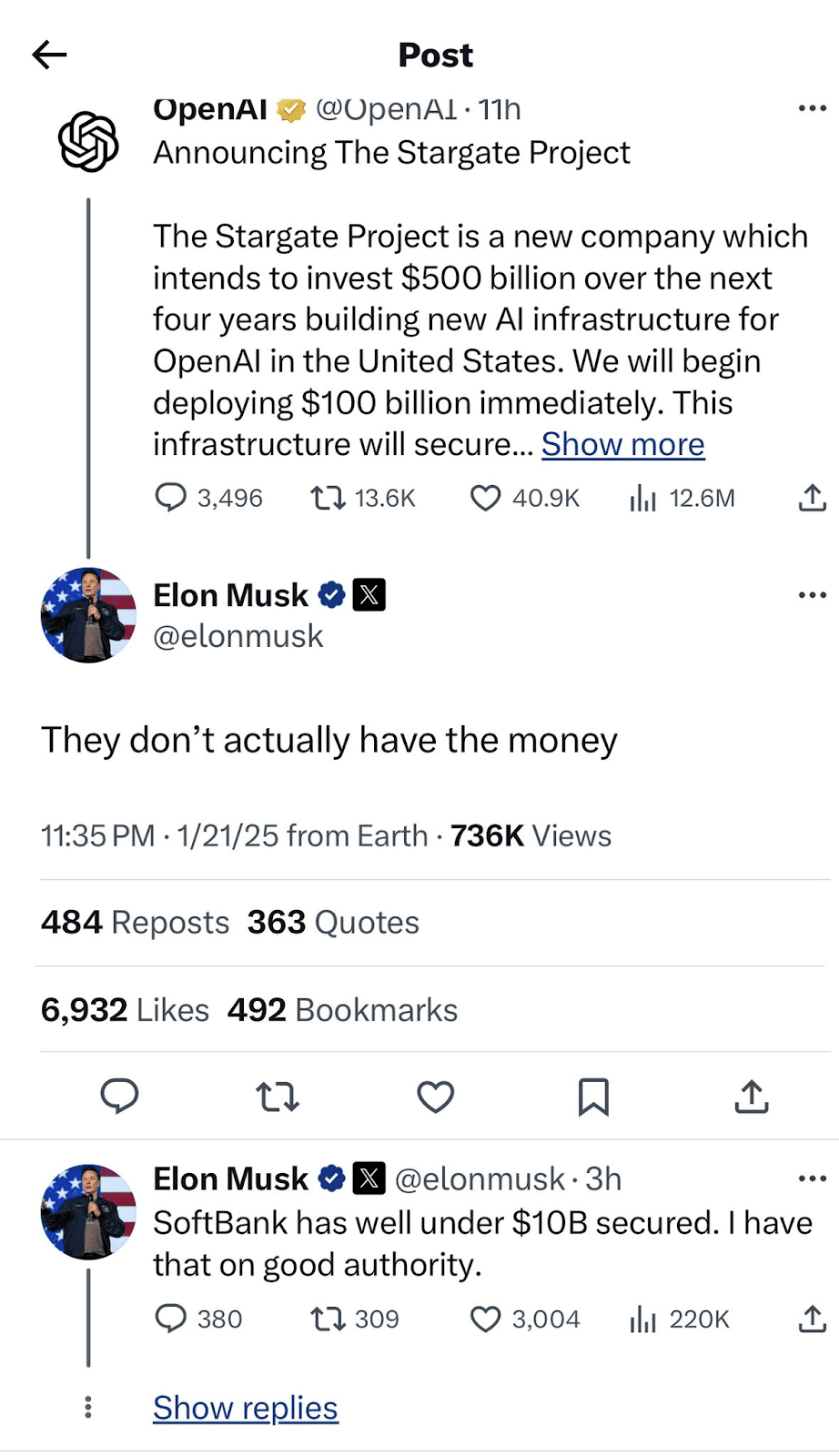
The Stargate Project is a major point of contention in the ongoing OpenAI saga. Announced at the White House in early 2025, this ambitious $500 billion AI infrastructure project is OpenAI's biggest move to expand its technological capabilities in the United States.
Key aspects of the Stargate Project include:
A massive partnership between OpenAI, Oracle, and international investors
Support from the Trump administration, who called it "the largest AI infrastructure project in history"
Plans to build extensive AI computing infrastructure across the United States
Backing from Japanese investment firms and an Emirati sovereign wealth fund
The project has sparked significant debate within the tech community. Despite being a close advisor to President Trump, Elon Musk publicly challenged the project's feasibility. He took to social media platform X to question whether the project's backers actually had access to the promised $500 billion in funding.
This controversy adds another layer of complexity to OpenAI's planned transition to a for-profit structure. The Stargate Project's success is closely tied to OpenAI's ability to secure major investments and maintain investor confidence.
The timing of Musk's takeover bid and his criticism of the Stargate Project has created uncertainty around both initiatives, potentially complicating OpenAI's negotiations with potential investors and partners.
What will this Bid mean for the future of AI?
The $97.4 billion bid for OpenAI represents more than just a corporate takeover attempt - it highlights a fundamental debate about the future direction of artificial intelligence development. This power struggle between two influential tech leaders could reshape how AI technology evolves and is controlled.
Several critical implications stand out:
The outcome could determine whether advanced AI development remains concentrated in for-profit companies or shifts toward a more open-source model
The bid raises questions about the balance between AI safety and commercial interests in developing powerful AI systems
If successful, the merger of xAI and OpenAI would create one of the largest AI research entities, potentially changing the complete AI game by tech companies.
This situation goes beyond just OpenAI's future. It touches on broader questions about who should control and guide AI development.
A successful takeover by Musk's consortium could lead to more emphasis on open-source development and safety protocols, while maintaining the current structure under Altman's leadership would likely focus on rapid commercial development with strong corporate partnerships.
Conclusion
Elon Musk's $97.4 billion bid for OpenAI is changing everything in the artificial intelligence industry, highlighting the ongoing debate between open-source development and commercial interests. This power struggle between Musk and Sam Altman extends beyond a simple corporate takeover, touching on fundamental questions about AI's future development and control.
The complexity of the situation is evident in multiple aspects: OpenAI's planned transition from nonprofit to for-profit status, the ambitious $500 billion Stargate Project, and the intricate legal challenges involving state attorneys general and competing interests. The outcome of this bid could significantly influence how AI technology is developed and governed in the years to come.
FAQs
1. Why is Elon Musk trying to buy OpenAI when he already owns xAI?
Musk claims he wants to return OpenAI to its original nonprofit, open-source mission. The bid suggests a potential merger between xAI and OpenAI, which would create a powerful AI entity focused on what Musk calls "safety-focused" development.
2. What happens to Microsoft's investment if Musk's bid succeeds?
Microsoft's existing investment and partnership with OpenAI would need to be reevaluated. While the specifics aren't clear, any change in ownership would likely require new negotiations regarding Microsoft's exclusive access to OpenAI's technology.
3. What's the Stargate Project, and why is it controversial?
The Stargate Project is a $500 billion AI infrastructure initiative announced by OpenAI and partners at the White House. It's controversial because Musk publicly questioned whether the project actually has the promised funding, despite Trump's administration backing it.
4. Will OpenAI's board seriously consider Musk's offer?
The board must evaluate the offer as part of their fiduciary duty, even though it's below OpenAI's current valuation of $157-300 billion. However, Musk's legal team has stated they're willing to match or exceed any competing bids.
5. How might this affect OpenAI's products like ChatGPT?
If Musk's bid succeeds, it could lead to ChatGPT and other OpenAI products becoming more open-source. However, immediate changes to existing products would be unlikely as the transition would take time.

Comments
Your comment has been submitted